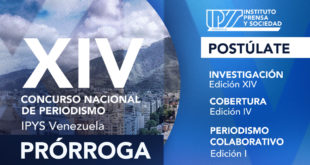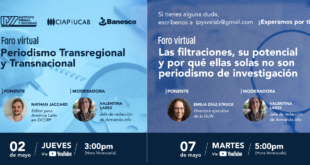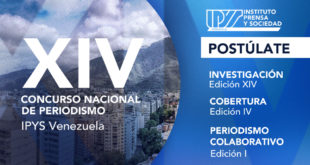Durante el mes de febrero de 2013, Juan de la Cruz Pereira, nuevo jefe del Cuerpo de Investigaciones Científicas, Penales y Criminalísticas (CICPC), en el estado Zulia (al occidente del país) informó a los periodistas que no se entregarían las minutas policiales y pidió que no visitaran la sede hasta tanto no se les convoque. Después de ese anuncio, los profesionales de la comunicación solo han recibido una invitación.
Ante esta limitación oficial, Jésika Ferrer, editora de sucesos de La Verdad, diario regional privado, comentó a IPYS Vezela que “las minutas también las negaron. Todo esto crea desinformación, porque no dejaremos de mostrar la realidad, pero tampoco tendremos una versión oficial de los hechos”.
María Carlota Marval, periodista del diario La Verdad en la Costa Oriental del Lago, aseguró a IPYS Venezuela que el Cuerpo de Policía del estado Zulia tiene la misma actitud. “La semana pasada hubo un homicidio a las 2:00 p.m. y nos enteramos a las 7:00 p.m. Cuando pedimos información, se burlaron de nosotros dándonos el resultado de un partido de futbol”.
Según el testimonio de varios reporteros consultados, en la sede regional del Instituto Nacioanl de Tránsito Terrestre ocurren las mismas limitaciones. Pese a que las autoridades de esta dependencia aseguran que sólo darán información a la prensa de manera presencial, cuando los reporteros para recabar los datos de algún incidente, no son atendidos por los funcionarios de este organismo público.
Por otra parte, un periodista, cuya identidad de reserva por confidencialidad, que del diario regional privado Panorama, explicó que desde hace un poco más de seis meses, la administración del Hospital Universitario de Maracaibo no permite la presencia de periodistas en la morgue de este centro asistencial. A pesar de estas dificultades, “siempre se hace el trabajo, pero es mucho más difícil”.
Según fuentes consultadas, ocurre lo mismo en el Hospital General del Sur Pedro Iturbe, centro que depende de la Gobernación del estado. Desde el cambio de gestión ejecutiva se prohibió el paso a la prensa, pero los reporteros aprovechan los momentos de abandono de la vigilancia para hacer el trabajo y hablar con los familiares.
Estas las limitaciones de acceso a la información pública que obstaculizan la labor de los equipos reporteriles de sucesos se presentan desde diciembre de 2012, a partir de la toma de posesión del nuevo gobernador en el estado Zulia, Francisco Arias Cárdenas, quien ganó las elecciones regionales abanderado por el Partido Socialista Unido de Venezuela (PSUV), fuerza política oficial. Desde entonces, los organismos han mantenido una actitud que apunta a ofrecer la menor información posible en casos de homicidios, secuestros, violaciones y otros delitos contra los ciudadanos.
Uno de los casos de limitaciones de acceso a la información pública, ocurrió el 10 de enero de 2013, cuando un operador del servicio de Emergencias 171, cuerpo de reportes telefónicos de accidentes adscrito a la Gobernación del estado Zulia, negaron información sobre las novedades diarias a los periodistas de la fuente de sucesos de distintos medios de comunicación, por supuesta prohibición de autoridades de la Gobernación del esta entidad, ubicada en el occidente de Venezuela (/alerta?id=3248&y=2013&m=01).
Etiqueta: limitaciones arbitrarias para la cobertura de asuntos públicos
_________________________________________________________________
Lea la versión en inglés
Regional organisms limit access of journalists to public information in Zulia
During February 2013, Juan de la Cruz Pereira, the new head of the Scientific, Penal and Criminalistic Investigation Corps (CICPC), in Zulia state (on the western part of the country) informed the journalists that police minutes would not be handed in and asked that their office not be visited unless invited to. After this announcement, the press professionals have received one single invitation.
In light of this official limitation, Jésika Ferrer, the events editor of La Verdad, a private regional newspaper, commented to IPYS Venezuela that “access was also denied to the minutes. This creates disinformation, because we shall continue to show the reality, but we will not have an official version of the events”.
María Carlota Marval, journalist at newspaper La Verdad in the eastern coast of Lake Maracaibo, assured IPYS Venezuela that the police corps of Zulia state has the same attitude. “Last week a homicide took place at 2:00 p.m. and we knew about it at 7:00 p.m. When we asked for information, they mocked us and gave us the results of a football match”.
Based on the testimony of several reporters consulted, at the regional office of the National Land Transit Institute the same limitations are occurring. Although the authorities in that office assured that they shall only give out information to the press if they are present, when the reporters go there to collect data on any incident they are not received by the officials of that public entity.
On the other hand, a journalist of private regional newspaper Panorama -whose identity shall remain undisclosed for protection purposes- explained that since a little over six months, the administration of the university hospital of Maracaibo does not allow the journalists into the morgue of that care facility. Despite these difficulties, “the job is always done, but it´s harder to do”.
According to sources consulted, the same is happening at the Pedro Iturbe General Hospital of the South, a center that depends on the state´s local government. Since the executive management changed hands entrance has been barred to the press, but the reporters take advantage when the security guards leave their posts to do their job and talk with family members of the persons hospitalized.
These limitations in accessing public information that hinder the job of events reporter teams are happening since December 2012, since Francisco Arias Cárdenas, the new governor of Zulia state, took over. He won the regional elections under the banner of the Partido Socialista Unido de Venezuela (PSUV), the official political party. Since then, the entities have maintained an attitude tending towards offering the least information possible on homicides, abductions, rapes and other crimes committed against the citizens.
One of the cases of limited access to public information happened on January 10, 2013, when an operator of 171 emergency services number, a corps that reports on accidents, ascribed to the Local government of Zulia state, gave no information on the daily events to the journalists that seek the source of events for several media, allegedly because the authorities of the Of the government office of that entity in western Venezuela banned them from doing so. (/alerta?id=3248&y=2013&m=01).
Label: arbitrary limitations to covering public affairs
 IPYS Instituto Prensa y Sociedad Venezuela
IPYS Instituto Prensa y Sociedad Venezuela



